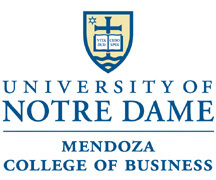
In September 2008, as the stock market began its precipitous slide, federal regulators abruptly moved to ban short sales of financial stocks. The hope was to protect companies whose stock was falling through the floor – pushed, critics said, by short sellers betting against the companies’ shares.
The ban went into effect on Sept. 19. In the next three weeks, the S&P 500 plunged another 28 percent. Many analysts thought that not only had the ban not shielded the companies as intended, but the further slide showed that short selling wasn’t quite the villain some regulators believed. The ban expired Oct. 8, 2008, but it was later blamed for several unintended and unwanted market effects, particularly on market strategies such as hedge funds that depend on short selling.
“Most economists felt the ban was a bad idea,” said Paul H. Schultz, John W. and Maude Clark Professor of Finance at the University of Notre Dame and an expert in market microstructure. “It amounted to shooting the messenger, but there was a lot of political pressure on regulators to be seen as doing something.”
It is just this sort of regulatory decision that a new center at Notre Dame hopes to inform with faculty research and expertise. The Center for the Study of Financial Regulation at the Mendoza College of Business intends to provide research and organize conferences that will study issues such as how well regulations have worked, and the economic impact of proposed regulations.
“We are in a time right now when people are talking about massive changes to the regulatory structure of financial markets and publicly traded companies. And I don’t think this is a temporary thing, just as the result of the financial problems of 2008,” said Schultz, the director of the new center.
“Finance is becoming more complex. There are many more derivative securities, and it has an international element that it hasn’t had in the past. So I think we will continually see more interest in regulation in the future.”
One of the center’s objectives will be to further ties between regulators and academic experts. The aim is to provide regulators with a broader, more long-term perspective of decisions under consideration. At the same time faculty members will benefit by being included in a continuing dialogue with members of the U.S. Securities and Exchange Commission, the Federal Reserve Board and other regulatory groups about very current finance issues, Schultz said. He expects many of the 30 faculty members in the Finance Department at the Mendoza College will participate in the center’s activities or research.
“A number of academics see existing regulations and feel that they can be done better,” Schultz said. “Poor regulations can be very costly.”
The Center for the Study of Financial Regulation hosted an event in April that brought together regulators from the SEC, academics and industry economists to discuss topics including the sub-prime mortgage market, short selling, CEO pay and credit rating agencies. The Conference on the Future of Securities Regulation featured speakers James Overdahl, chief economist for the SEC, and Chester Spatt, chief economist for the SEC from 2004 to 2007. A second conference is planned for next spring to be held in Chicago, with topics to be decided based on current regulatory issues.
Schultz earned his bachelor’s degree from Macalester College, and his MBA degree and doctorate in finance and economics from the University of Chicago. His expertise is in corporate finance and market microstructure. His recent research interests include the collapse of Internet stock prices, arbitrage and the prices of dual class shares, and the ability of mutual funds to pick stocks.
Contact: Paul Schultz, 574-631-3338, Schultz.19@nd.edu